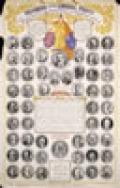Page 1: Biography
Wilford, Thomas Mason
1870–1939
Lawyer, politician, sportsman, diplomat
This biography, written by Susan Butterworth, was first published in the Dictionary of New Zealand Biography in 1996.
Thomas Mason Wilford was born in Lower Hutt, New Zealand, on 20 June 1870 to John George Frederick Wilford, a surgeon, and his wife, Elizabeth Catherine Mason, daughter of Thomas Mason, MHR. He was educated at Wellington College and Christ's College, Christchurch, before joining the legal firm of A. & C. Brandon. He showed such promise that he passed his final examinations by the age of 18 although he could not be admitted to the Bar until he was 21. On 17 February 1892, at Dunedin, he married Georgia Constance McLean, daughter of Sir George McLean, MLC; they were to have one son and one daughter. He then practised for three years with W. T. L. Travers in Wellington before setting up on his own account. He was later joined by Phineas Levi in the firm Wilford and Levi (subsequently Wilford, Levi and Jackson).
Wilford's urbane, genial personality and considerable gifts as an orator and actor underlay the two passions of his life – law and politics. He became a distinguished barrister, outstanding as an advocate with juries, and highly regarded within the legal profession for his courtesy and helpfulness to colleagues. He entered politics as soon as he could, standing as a Liberal in 1896 for the seat of Wellington Suburbs; he won narrowly but was unseated by an electoral petition. He won the seat in 1899, but in 1902 stood for the Hutt seat which he represented until 1929.
Wilford's best years were from 1902 to 1911. He had great physical vitality and proved a tireless worker for his electorate. He cut his teeth on the issue of the redevelopment of the Hutt Road and railway between 1899 and 1911, an extremely costly and complex exercise in which Wilford ably pressed the interests of a number of local bodies. He was a member of the Wellington Harbour Board from 1900 to 1910 and chairman from 1908 to 1910. Under Wilford's chairmanship the board continued the most ambitious programme of reclamations and improvements yet seen in the port of Wellington. He resigned in 1910 on becoming mayor of Wellington.
Wilford was also an effective chairman of committees of the House of Representatives and was thought likely to be a future Speaker. He was a lifelong supporter of a reform of matrimonial law, both to shorten the period of separation before divorce and to allow the legitimation of children born of de facto unions on the marriage of their parents.
Despite his official and professional commitments Wilford played or supported numerous sports: rugby (at which he had been a provincial representative in 1888), tennis, horse-racing and -breeding, hunting, rowing, golf and fishing. He was a life member of the Wellington Racing Club, the Boxing Association and the Wellington Rugby Football Union. He was also a talented amateur in musical comedy and a notable raconteur.
In mid 1911 Wilford almost died from complications following an operation for appendicitis and was always in poor health afterwards. After being re-elected unopposed he resigned as mayor of Wellington. He required surgery in England in early 1912, an absence which also weakened his position within the Liberal party. In the crisis following the collapse of the Mackenzie ministry in July 1912 he indicated that he might vote with the Reform Party over the leasehold–freehold issue because he felt the leasehold wing of the Liberal party had taken an extreme position; although he did not do so, his loyalty came under suspicion.
For these reasons Wilford's political career never fulfilled its early promise, although it was by no means fruitless. He served in the wartime National cabinet as minister of marine, minister of justice and minister of stamp duties from 1917 to 1919, and chaired the Waterside Accidents Commission of 1918 which greatly improved waterside working conditions.
In 1920 Wilford became leader of the Liberals on the death of W. D. S. Macdonald but was unable to stem the continued decline of the party. He had to contend with colleagues who would have preferred to remain leaderless until Sir Joseph Ward, defeated in 1919, could re-enter Parliament. By 1922 he had reconciled himself with these members and had become leader of the renamed United Progressive Liberal Labour Party. He was unsuccessful at negotiating a merger with Reform in 1925, after which the party was renamed National. Wilford resigned the leadership for health reasons and again travelled to England for medical treatment. In the elections of 1925 colleagues successfully campaigned on his behalf. John A. Lee, who knew him well, considered that although no one could have saved the Liberal party, in better health Wilford may have delayed its demise and had his turn as prime minister. He was minister of justice and minister of defence for one year following the election of 1928.
In 1929 Wilford was appointed King's counsel and was then immediately appointed high commissioner for New Zealand in the United Kingdom and knighted. In this office he represented New Zealand at the League of Nations, at the Conference for the Reduction and Limitation of Armaments, and on a number of imperial and league bodies. He was also active in business and in the Federation of Chambers of Commerce of the British Empire.
Wilford retired from public life on his return from Britain in 1935 and died at Wellington on 22 June 1939. He was survived by his wife and children. As a political leader he has generally been either overlooked or dismissed as a maverick and a lightweight, and no doubt his somewhat theatrical personality encouraged this. In fact he was an able and essentially moderate man who was prevented by illness and circumstances from applying his talents fully.
